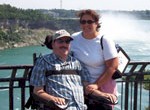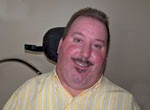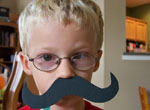Paralyzed Blue Bell Man Finds New Way To Degree
January 16, 1992
Source: The Times Herald
Author: Jessica A. Carville
George Butera is 24 years old, a college graduate who’s looking for a job and willing to work his way up the ladder.
Sounds like a lot of other young men his age. But Butera isn’t like the others. In June 1986, the Blue Bell resident was injured in a diving accident that left him without the use of his arms and legs.
Butera remembers diving into a wave while swimming in Ocean City, N.J., and being forced to the bottom. He doesn’t recall hitting his head, breaking his neck between the third and fourth vertebrae.
The dive paralyzed him from the neck down.
At the time, he had finished one semester of engineering courses at Temple University’s Ambler campus and had begun his second semester.
He was in the process of transferring to the marketing and management program when the accident occurred.
Before the accident, he had been athletic; he was a member of the swimming, soccer and men’s lacrosse teams at Wissahickon High School before graduating in 1985. After the accident, his lifestyle changed drastically.
Finishing college became less of a priority as Butera faced months of recovery and rehabilitation. He was hospitalized for six months – three spent in Jefferson University Hospital in Philadelphia and three at a rehabilitation facility in Colorado.
He returned to school in September 1987, encountering challenges that never crossed his mind before his paralyzation.
In order to complete what had once been simple tasks, Butera had to learn new methods. Using a mouthpiece to press individual keys, he wrote his first paper for school after the accident on a manual typewriter.
“It was a very short paper,” he joked during an interview last week, adding that a neighbor retyped it on a word processor before it was turned in.
Other everyday work required adjustments as well – volunteers from classes took notes for him and he had to take tests orally, dictating answers to another student.
The complexity of common tasks was just one part of Butera’s most difficult hurdle: loss of independence.
“Having to depend on other people was – and still is – the hardest thing to think about,” he said.
However, Butera is becoming increasingly independent with the use of equipment designed for the disabled. He now has a computerized telephone system that allows him to easily answer and make calls. The computer system also is equipped with a mouthpiece that makes it possible for him to type.
Butera believes anyone facing adversity, whether it is a physical disability or other problem, must keep trying to overcome it.
“Don’t let it get you down, control you or consume you,” he advises. “There is usually someone else who is worse off.”
Butera said his friends and family, as well as the students and faculty at Temple-Ambler, were a great help to him as he readjusted.
And in December, he graduated from Temple’s marketing and management program with a 3.28 grade-point average.
“I am pretty proud of what I have done,” Butera said. “Now that I am out of school, I want to get a job… I worked pretty hard for this degree and I would like to use it.”
He has no specific job plans, but is sending out resumes and looking into different areas that interest him.
“To me, a job isn’t just a means of making money. It’s something I need to do, and I’m willing to work my way up from any position,” he said.



